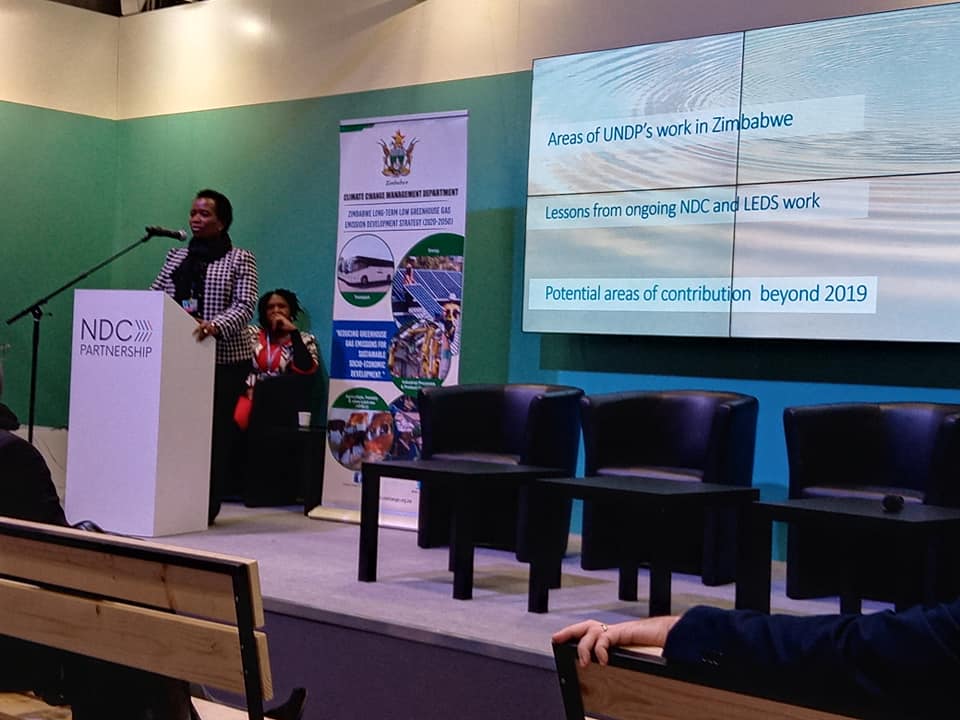|
Getting your Trinity Audio player ready…
|
By Joyce Mukucha
The United Nations Development Programme (UNDP) has handed over five project vehicles to the Ministry of Lands, Agricultural, Fisheries, Water and Rural Resettlement under the Green Climate Fund Building resilience of vulnerable agricultural livelihoods in the Southern Zimbabwe project.
Speaking on behalf of her superior during the handover ceremony in Harare on the 15th of September 2021, UNDP Head of Poverty, Environment and Climate, Anne Madzara said the gesture was aimed at advancing the national climate resilience building agenda through increased mobility and monitoring of projects intervention by project partners implementing the project in the three provinces.
UNDP expects the project vehicles to support and enable the partners in the provinces and districts to be readily available on the ground in as much as monitoring, supporting climate-resilient agricultural production and disseminating critical information to farmers is concerned.
“These project vehicles are earmarked for the three project Provinces (Manicaland, Masvingo and Matebeleland South) and are meant to facilitate work in the 15 project districts (Buhera, Chimanimani, Chipinge, Mangwe Beitbridge, Gwanda, Matobo, Insiza, Umzingwane, Mwenezi, Chiredzi, Masvingo, Bikita, Chivi and Zaka).
“It is UNDP’s hope that the vehicle support will enable partners in the provinces and districts to be present on the ground as they support climate-resilient agricultural production, innovation platforms and farmer field schools, as they conduct revitalization works to climate-proof irrigation Infrastructure in 22 irrigation sites, as well as they facilitate the climate and weather information to reach these farmers,” Madzara said.
She highlighted that the entire nation was experiencing the devastating effects of climate change but the Southern provinces of Zimbabwe were hard hit the most thus the mobility capacity was extremely necessary to ensure that their vulnerability is dealt with.
“While climate change affects the entire country, impacts are experienced most intensely in the Southern provinces of Zimbabwe where most smallholder farmers are extremely vulnerable to increasing climate hazards and where their situation is exacerbated by poverty, limited alternative livelihood options, and limited access services and productive assets. These highly vulnerable areas are the ones that these vehicles have been earmarked for.”
The move comes at a critical juncture as the country has promulgated a number of agrarian reforms, policies, and strategies including the agriculture and food systems transformation strategy, livestock growth plan, maize wheat, and soya-bean recovery plan in line with the economic growth trajectory of a Middle Income Society by 2030.
“This GCF-UNDP-GOV resilience building for agriculture Livelihoods project is a critical piece of the array of strategies and key contributions to a climate-resilient agriculture sector and more specifically a key contributor to sustainable agriculture and for systems for Zimbabwe.”
The climate resilience project, besides contributing to the national food security ambition, she said, was also an important initiative to achieve the national climate change adaptation milestone set in the Nationally Determined Contributions.
Speaking at the same occasion, the Permanent Secretary, Engineer Tinayeshe Mutazu applauded UNDP for their continued unwavering support in as much as improving the adaptive capacities and resilience of vulnerable communities is concerned.
He said the joint collaboration will continue and even be strengthened as partners journey together to building climate-resilient communities in Southern Zimbabwe over the next seven years as the country moves towards the attainment of Vision 2030 sustainable goals.
“Today’s milestone put us in good stead as we journey towards the attainment of Vision 2030 agriculturally. Allow me to commend and appreciate our development partner UNDP, we remain grateful for your leadership in supporting a project that aligns itself to the upcoming United Nations Sustainability Co-operation Framework and the recently launched 5-year National Development Strategy,” said Mutazu.
He said there was a need to continue to climate-proof agricultural production systems, intensify production, and link, smallholder farmers, to markets for Sustainability.
The ambition of the project, it has been pointed out, is to reach an estimated at 2, 302, 120 people with support in building climate resilience across the three priority provinces.
